Nigeria’s rich diversity, home to over 300 ethnic groups, is often framed through the lens of division: ethno-religious conflict, regional rivalries, or competing political blocs.
Yet, in the midst of these tensions, traditional culture offers a powerful counter-narrative. One particularly symbolic practice is the conferment of chieftaincy titles across ethnic boundaries—a gesture where one cultural group honors a leader from another, recognizing their contributions to peace, unity, or development.
In recent years, more Nigerian figures—especially those from Yoruba, Hausa/Fulani, and minority ethnic groups—have received Igbo, Tiv, Itsekiri, or Kanuri chieftaincy titles, and vice versa.
These honors cut across historical divides and help shape a national identity built not just on diversity but on interconnected respect.
Below is a list of notable cross-ethnic chieftaincy honors that reflect this evolving tradition of cultural diplomacy:
Remi Tinubu Conferred “Ugosimba I of Enugu”
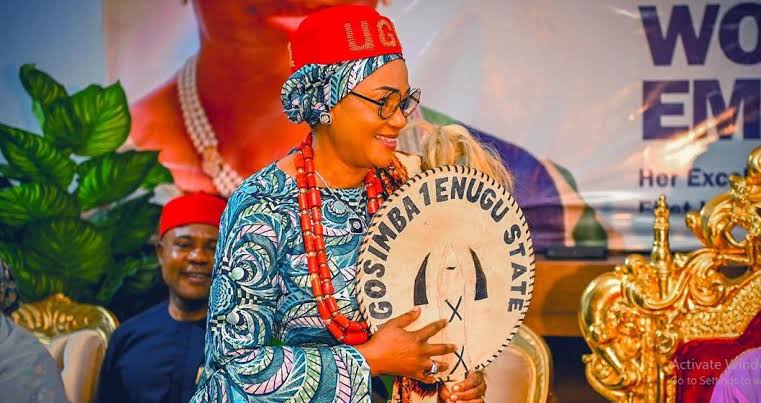
On June 10, 2025, Nigeria’s First Lady, Senator Oluremi Tinubu, was honored with the chieftaincy title “Ugosimba I of Enugu” by the Enugu State Traditional Rulers Council, during her official visit to the state.
“Ugosimba,” loosely translated as “the jewel that radiates from a distant kingdom” or “distinguished daughter in a foreign land,” was conferred in recognition of her contributions to women’s empowerment, support for the underprivileged, and national humanitarian efforts.
In presenting the honor, Igwe Dr. Ikechukwu Asadu, Chairman of the Enugu Traditional Rulers Council, described her as:
“a beacon of compassion for the less privileged and a mother to all Nigerians.”
Mrs. Tinubu responded by calling the moment one she would cherish forever, saying:
“This recognition is not just for me, but for President Tinubu, for all Nigerian women, and for every effort to uplift our nation.”
Cross-Ethnic Significance
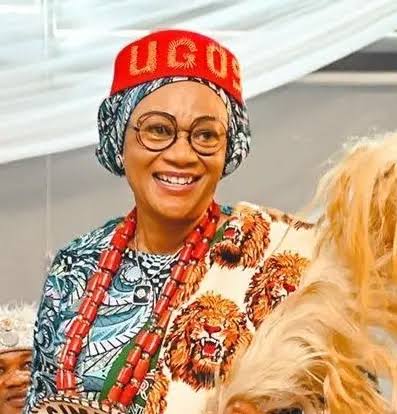
This marks a Yoruba First Lady being formally recognized by Igbo royal authorities, signaling growing efforts to bridge political and ethnic divides.
It builds on earlier cultural diplomacy efforts and reflects how traditional leadership can promote inclusion and national solidarity.
The honor came during a broader engagement with the Southeast, where Mrs. Tinubu also met with nurses, midwives, and local women’s cooperatives.
2. Bola Tinubu’s Dual Igbo Titles
Titles: “Eze Udo of Igbo Land” and “Omezeri Igbo I”
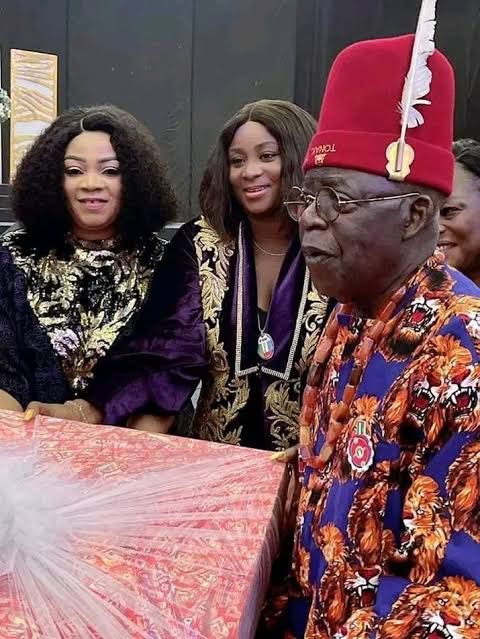
President Bola Ahmed Tinubu, a Yoruba leader from Lagos State, received two significant chieftaincy titles from the Southeast in 2023:
Eze Udo (“King of Peace”) during the Ofala Festival in Anambra State.
Omezeri Igbo I (“He Who Has Done Well for the Igbo”) in Abia State.
The honors were conferred by Igbo monarchs, in the presence of top Southeast APC leaders and were linked to the Peace in South East Project (PISE‑P) spearheaded by Deputy Speaker Benjamin Kalu.
Significance: A Yoruba president being embraced by Igbo royal institutions—particularly after a highly contested election—marked a historic gesture of reconciliation.
3. Muhammadu Buhari’s String of Igbo Titles
Titles: “Enyioma I of Ebonyi”, “Ochioha I”, “Ogbuagu I”, “Ikeogu I”
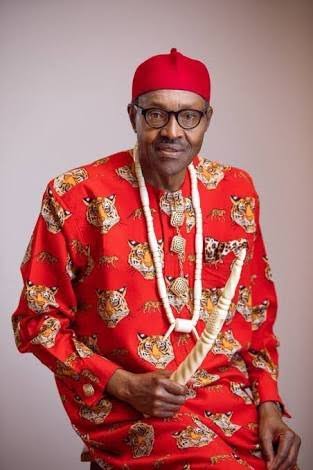
Despite his Fulani-Muslim background and perceived strained relations with the Southeast, former President Muhammadu Buhari received multiple traditional titles from Igbo states, including:
“Ochioha I” (Leader of the People)
“Ogbuagu I” (Tiger Slayer / Warrior)
“Enyioma I of Ebonyi” (A Good Friend of Ebonyi)
These titles reflected acknowledgments of his administration’s infrastructural contributions to the region, including the Second Niger Bridge.
Significance: A Fulani president recognized in Igbo heartlands demonstrates how traditional titles can play a role in mending historic political divisions.
4) VP Kashim Shettima’s Role in Accepting Igbo Titles
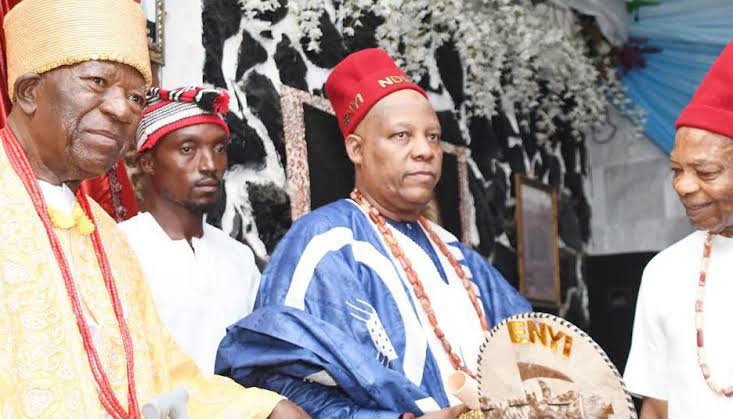
Representation: Chieftaincy on Behalf of President Tinubu
At the 2023 Ukpo Ofala Festival in Anambra, Vice President Kashim Shettima, a Kanuri Muslim from Borno State, received the title “Eze Udo of Igbo Land” on behalf of President Tinubu. He was also honored with the title “Enyi Ndigbo” (Friend of the Igbo).
Dressed in full Igbo regalia and warmly welcomed, Shettima praised the ceremony as an embodiment of Nigeria’s unity-in-diversity. The event coincided with the launch of the Peace in South East Project (PISE‑P).
Significance: A Kanuri figure being embraced by Igbo traditional leaders further affirms Nigeria’s interethnic potential and the symbolic power of traditional institutions.
Igbos Honoring Yoruba Celebrities
1) D’banj: “Enyi Ka Nwanne of Amuzi Obowo” (Imo, Jan 2018)
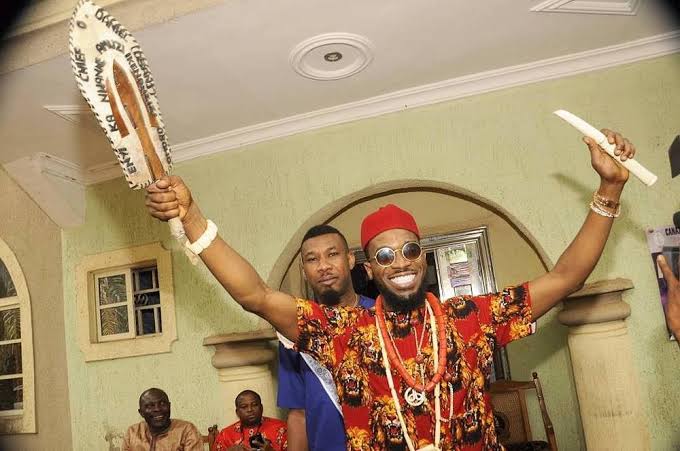
In January 2018, renowned musician Oladapo Oyebanjo (D’banj) was conferred the title “Enyi Ka Nwanne of Amuzi Obowo” by traditional rulers in Imo State .
Translated as “A friend greater than a sibling”, the title was bestowed in recognition of his charitable acts and cultural influence in the community. At the ceremony, he donned full Igbo regalia, signaling respect for local tradition .
Cross‑Ethnic Importance
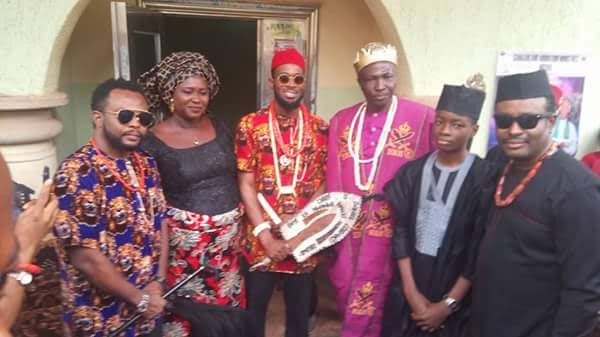
Born in Ogun State, D’banj is widely considered Yoruba; his acceptance of this Igbo title illustrates entertainment’s role in cultural diplomacy.
It underscores how celebrity philanthropy and cultural outreach can forge deeper community ties beyond ethnic origins.
2. Olakunle Churchill: “Ezinwa Chukwu Mere Eze I” (Enugu, April 2018)
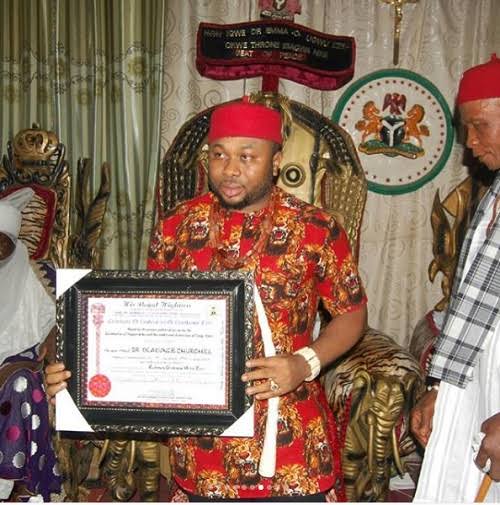
Businessman and philanthropist Olakunle Churchill received the chieftaincy title “Ezinwa Chukwu Mere Eze I”—meaning “God-crowned good child who becomes king”—from Enugu’s Igwe Dr. Emmanuel Ugwu during the Ofalla Festival in April 2018 .
He was commended for youth empowerment in agricultural initiatives and his extensive humanitarian interventions across the Southeast.
Cross‑Ethnic Importance
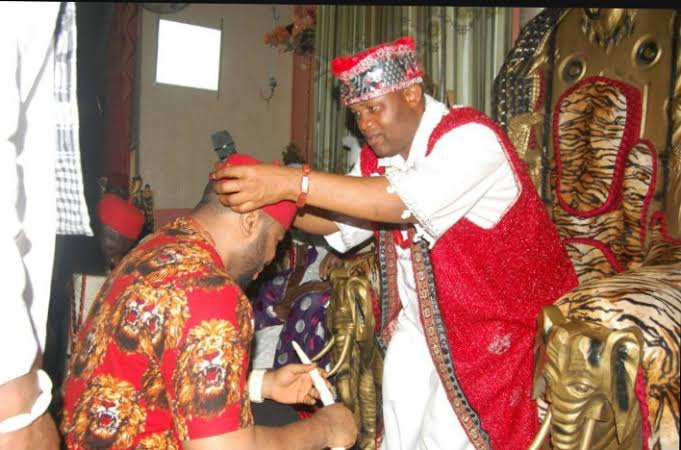
Churchill, originally from Ondo State (Yoruba), receiving a major Igbo title magnifies the national significance of philanthropic leadership.
The wide attendance of emirs, governors, and traditional leaders from across Nigeria highlighted the event’s inter-ethnic inclusivity.
3) 2Baba (formerly 2Face Idibia) – “Tafidan Kudendan of Kudendan” (Kaduna, Nov 2015)
In November 2015, Innocent Idibia—better known as 2Baba—received the title “Tafidan Kudendan” (Ambassador of Peace) in Kaduna State. A prominent Benue-born (Idoma‑Igbo-background) musician, he earned recognition for promoting peaceful voting through his “Vote Not Fight” campaign. This honor was bestowed by the Galadima of Kudendan Chiefdom, symbolizing a Northern community embracing a Southern music icon for unifying work .
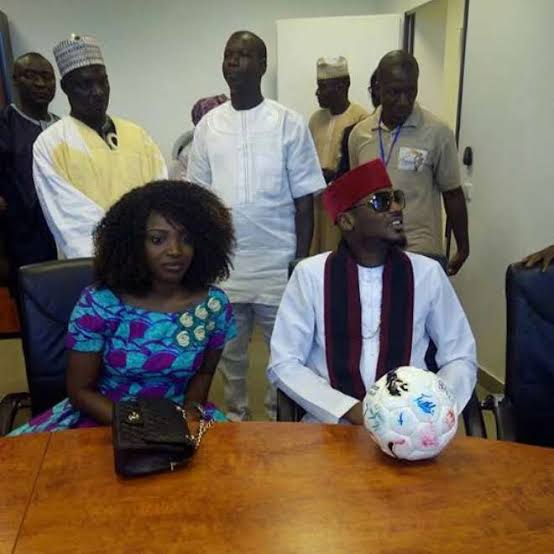
His ex-wife, Annie Macaulay, was also honored as “Matan Tafindan” (Lady of the Peace Ambassador) during the same ceremonial turbaning .
Diaspora and Non-Political Cross-Ethnic Recognition

Hajia Bola Shagaya (Yoruba from Kwara) has received strong support from Eastern business coalitions for her inter-regional investment in textile and SME markets.
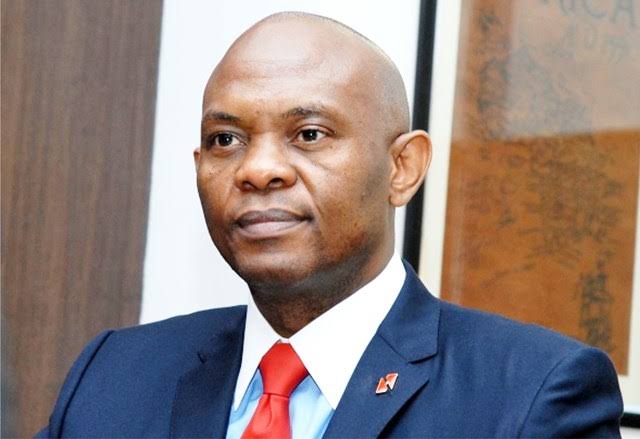
Tony Elumelu (Delta-Igbo) has been honored in northern emirates for his job creation initiatives through the Tony Elumelu Foundation.
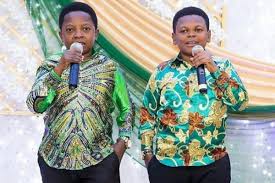
Chinedu Ikedieze and Osita Iheme (Aki and Pawpaw) are adored in northern Nigeria, where they are often given Hausa nicknames and featured in local culture.
Significance: These cultural endorsements show how cross-ethnic admiration can extend beyond politics, especially through economic impact and entertainment.
Why Cross‑Ethnic Titles Matter
1. Cultural Diplomacy
These honors signal mutual respect across Nigeria’s ethnic mosaic—crucial in politically sensitive times.
2. National Unity
By spotlighting figures who transcend their ethnic origins, they underscore Nigeria’s identity beyond tribal lines.
3 Personal Branding & Identity
Public figures harness this to craft an image of inclusivity—celebrating shared Nigerian heritage over regional origins.
4. Healing Divides
Such gestures can help redeem reputations—as seen in Remi Tinubu’s case—by publicly affirming communal bonds.
PATH TO PROGRESS
Tie Honors to Development: Ensure that chieftaincy honors are linked to measurable impact—such as philanthropy, local investment, or peacebuilding.
Reciprocal Recognition: Encourage more Igbo, Ijaw, Kanuri, or Nupe leaders to be honored in Yoruba or Hausa lands, promoting balanced national symbolism.
Youth Inclusion: Involve younger Nigerians in these cultural exchanges to revive appreciation for traditional leadership and its modern roles.
CLOSING REFLECTION: Honors That Heal
Cross-ethnic chieftaincy titles are more than traditional formalities—they are expressions of hope in a divided nation. Whether conferred on a Yoruba First Lady by Igbo monarchs or a Kanuri vice president by an Eastern royal council, these honors can help repair distrust and forge new alliances.
Remi Tinubu’s title as “Ugosimba I of Enugu” is not just a badge of respect—it is a statement of Nigeria’s possibilities when tradition meets transformation, and when heritage becomes a bridge, not a boundary.













Leave a comment